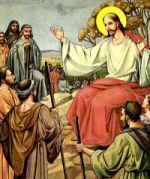Make your gift today!
Help keep Catholics around the world educated and informed.
Already donated? Log in to stop seeing these donation pop-ups.
Catholic World News News Feature
Pope concludes weekly series of talks on St. Paul February 04, 2009
Pope Benedict XVI finished a long series of weekly talks on St. Paul on February 4, with a talk at his weekly public audience about the Apostle's martyrdom.
Since July 2008, the Holy Father has devoted each of his Wednesday audiences to a talk on the influence of St. Paul-- only occasionally breaking up the series to speak on other timely topics. (Earlier in his pontificate, Benedict XVI had delivered a series of talks on the early Church fathers, and concluded a series on the Psalms that his predecessor, John Paul II, had begun.) This series of talks, which the Pope began in preparation for the Pauline year, has covered both the epistles of St. Paul and his life story.
In his February 4 address, the Pope remarked that "the figure of St. Paul towers over the events of his earthly life and death. He left an extraordinary spiritual heritage."
Readings from the writings of St. Paul soon entered into the liturgy of the early Church, forming the pattern of readings from the Old and New Testament that endures to this day. The epistles, he said, have always provided "spiritual nourishment for the faithful of all times."
The Church Fathers drew on St. Paul's work, St. Augustine credited the Apostle as a decisive force in his conversion, and St. Thomas Aquinas furnished "the finest fruit of medieval exegesis" with his commentary on the Pauline epistles, the Pope continued. While Martin Luther saw the Church as the embodiment of the legalism condemned by St. Paul, the Council of Trent "a synthesis between the Law and the Gospel."
More recently, the Pope continued, the writings of St. Paul have helped to fuel ecumenical progress. He explained that "there has been increasing convergence between Catholic and Protestant exegesis, and conformity is being discovered on the very point that gave rise to the greatest historical disagreement."
For all Christians, the Pope concluded, St. Paul is a reliable source of guidance and inspiration. "Drawing from him, both from his apostolic example and his doctrine, will be a stimulus for us, if not a guarantee, to consolidate our Christian identity and invigorate the entire Church."






